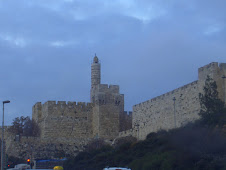Aharon Appelfeld and Nicole Krauss chating about their common Judaism, life, and literature.

Mishkenot Sha’ananim, in Yemim Moshe, the first neighborhood outside the walls of Jerusalem’s old city, hosted The International Writers Festival in its International Cultural and Conference Center, where Israelis and international writers were chatting in pairs about their books. Because of my schedule of classes at the University, I could not attend most of the events. However, there was one event I could not allow myself to miss: Aharon Appelfeld's sharing with another writer. Last Thursday (on May 6), he and Nicole Krauss had an interesting and great conversation about their common Judaism, life, and literature. A lot of memories returned when I heard him that afternoon, at Mishkenot Sha’ananim.
Seeing Aharon Appelfeld again has been one of the best experiences I have had here in Israel since I came back to study. The first time I meet Aharon Appelfeld was as his student at Chaim Greenberg College here in Jerusalem, in 1973; when he was my teacher of Prose. I remember his soft voice telling us the stories about the Holocaust, how he escaped when he was just a child, what happened to his parents, the bohemian life he saw in Tel Aviv, his experiences when he was adopted, and his experiences when he arrived in Israel. In addition to hearing his stories, we, as students, read and analyzed parts of his books.
Our childhood and our experiences from this period of our lives, yours and mine, have not been oppressed beneath the same shadow which loomed over Aharon Appelfeld in his “childhood”[1]. His “childhood”, as he describes it, is the Holocaust as he knew it between the ages of 8 and 12. “It was my despair and my joy”. “I was terrified, but also I was a child”. "I was adopted by criminals in the forest, and … I learned a lot”. The experiences, -as Appelfeld used to say in class and that afternoon, enriched him. From these experiences, he learned to survive, to be what he is now. “The experiences that you have as a child are planted in you forever in your life”, he said. After his mother was killed and his father was sent to the forced labor camp, he knew that never again would he be at home and/or sees his parents. “I never can be a good boy as my parents had dreamed”
Aharon Appelfeld speaking about his experiences:

Aharon Appelfeld giving me one of his books, we said lehitraot [see you later].

"The Holocaust is a central event in many people's lives, but it also has become a metaphor for our century. There cannot be an end to speaking and writing about it. Besides, in Israel, everyone carries a biography deep inside him." (Aharon Appelfeld)
[1]I am adding quotes to the word “childhood”, because, usually, when we speak about childhood, it is something special and sweet, bringing us kindly memories; but the “childhood” that Aharon Appelfeld described was nothing of the kind.

No comments:
Post a Comment